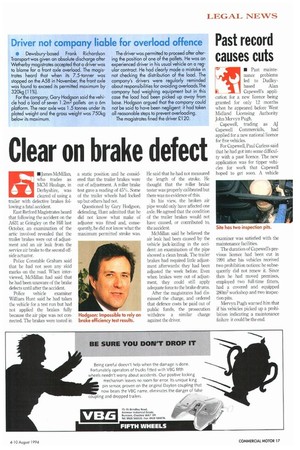Clear on brake defect
Page 19

If you've noticed an error in this article please click here to report it so we can fix it.
• James McMillan, who trades as MCM Haulage, in Derbyshire, was cleared of using a trailer with defective brakes following a fatal accident.
East Retford Magistrates heard that following the accident on the A631 at Gringley on the Hill last October, an examination of the artic involved revealed that the trailer brakes were out of adjustment and an air leak from the service air brake to the second offside actuator.
Police Constable Graham said that he had not seen any skid marks on the road. When interviewed, McMillan had said that he had been unaware of the brake defects until after the accident.
Police vehicle examiner William Hunt said he had taken the vehicle for a test run but had not applied the brakes fully because the air pipe was not connected. The brakes were tested in a static position and he considered that the trailer brakes were out of adjustment. A roller brake test gave a reading of 45%. Some of the trailer wheels had locked up but others had not.
Questioned by Gary Hodgson, defending, Hunt admitted that he did not know what make of adjuster was fitted and, consequently, he did not know what the maximum permitted stroke was. He said that he had not measured the length of the stroke. He thought that the roller brake tester was properly calibrated but there was no evidence of this.
In his view, the broken air pipe would only have affected one axle. He agreed that the condition of the trailer brakes would not have caused, or contributed to, the accident.
McMillan said he believed the air leak had been caused by the vehicle jack-knifing in the accident: an examination of the pipe showed a clean break. The trailer brakes had required little adjustment afterwards: they had been adjusted the week before. Even when brakes were out of adjustment, they could still apply adequate force to the brake drums.
After the magistrates had dismissed the charge, and ordered that defence costs be paid out of public funds, the prosecution withdrew a similar charge against the driver. examiner was satisfied with the maintenance facilities.
The duration of Capewell's previous licence had been cut in 1991 after his vehicles received two prohibition notices: he subsequently did not renew it. Since then he had moved premises, employed two full-time fitters, had a covered and equipped 280m2 workshop and two inspection pits.
Mervyn Pugh warned him that if his vehicles picked up a prohibition indicating a maintenance failure it could be the end.






















































































